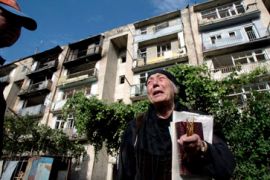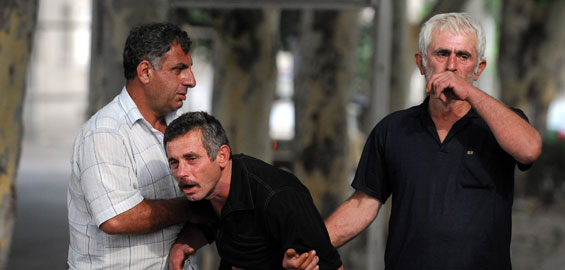Reporter’s diary: Counting the cost
Al Jazeera’s Alan Fisher visits the town bombarded by the Russians.

 |
| Georgians in Gori must rebuild their towns and their lives [AFP] |
Gori was on the frontline. A town devastated by the short but bloody war between Russia and Georgia.
Just a short drive from the edge of town sits a small housing estate. On both sides short blocks of homes sit aside a main square.
There is not a window intact. Debris is strewn everywhere and the thick acrid smell of smoke hangs heavy in the air. On the balcony of one apartment, a large jagged piece of metal is stuck fast in the railings.
Walking around, the sound of crunching glass punctuates every step. The bombing here came without warning as people did what people do. They say 60 people died here.
In the main square, the huge statue of Stalin dominates. This was his home town.
At the local pharmacy and cafe, the owner walks from room to room, crying and she surveys the damage. She had no words. Her assistant sweeps the shattered glass.
It makes little difference, but for her, at least it’s a start.
Russian target
There are few people in the town, and no sign of the soldiers who should have been here to protect them as it became a target for the Russian aircraft.
Those who stayed have been told that there is a ceasefire but they have spent the last five days running for their lives, hiding where they could and hoping the bombs would fall somewhere else.
This was a war which started without warning. No one is ready to believe that it’s finally over.
Aermane Mazanshisvili lived here most of his life.
 |
| Gori came under sustained bombardment by Russian forces [EPA] |
He tells me: “We just heard a huge noise, a boom. Nobody knew it was coming. They were out on the streets and the bombs hit, buidlings were wrecked, glass was everywhere, cars destroyed and people injured. It was awful.”
Around the corner, the TV station lies deserted. Five people died here in Tuesday morning’s attack. The buildings are pockmarked by shrapnel.
On the wall inside, the clock marks 10:08am the moment the bombs fell.
One man holds up the fragments.
“It drops and explodes before it hits the ground. It doesn’t leave a crater but sprays hot metal so far,” he says.
“It’s lethal,” he tells me, and it was.
We try to drive another street but locals start waving at us frantically.
“There is a bomb in the building that hasn’t gone off,” one man says. The war may be over, the danger is not.
The people here now have to do what they can to put back together the buildings and their lives. And they will be hoping that the ceasefire holds and the war really has ended.